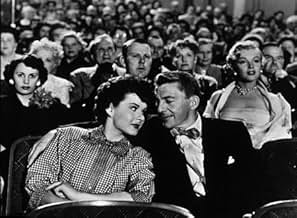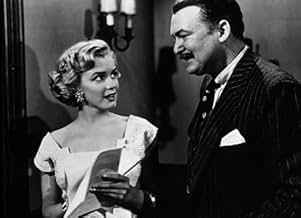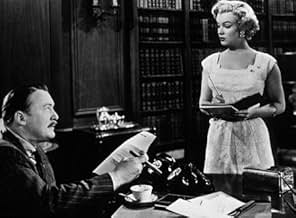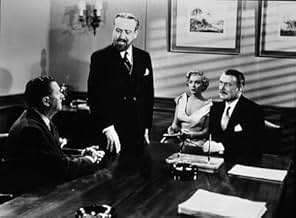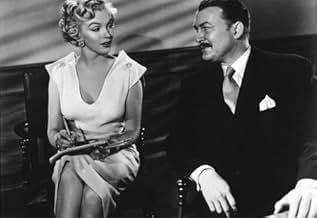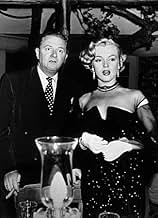Aggiungi una trama nella tua linguaA 65-year-old printer hatches an elaborate scheme to avoid forced retirement.A 65-year-old printer hatches an elaborate scheme to avoid forced retirement.A 65-year-old printer hatches an elaborate scheme to avoid forced retirement.
- Willie McKinley
- (as Rusty Tamblyn)
- Concert Guest
- (non citato nei titoli originali)
- Head of Sales
- (non citato nei titoli originali)
- Luncheon Guest
- (non citato nei titoli originali)
- Clancy
- (non citato nei titoli originali)
- Concert Guest
- (non citato nei titoli originali)
- Concert Guest
- (non citato nei titoli originali)
Recensioni in evidenza
"As Young As You Feel" is a comedy, but it contains serious messages about age-related issues and the unintended effects of technology and modern production methods. More than sixty years later, those viewpoints--as expressed by John--are just as relevant today.
But the messages do not sidetrack the fun. Monty Woolley plays John with a twinkle in his eye. His positivity influences the lives of others (on a grand scale), except maybe for a couple of annoying members of his own family.
One notable aspect of this film is that is adapted from a story by Paddy Chayefsky, who won three Oscars for screen writing. After his service in the war, Chayefsky worked in his uncle's printshop--a connection with this story.
Marilyn Monroe has a small, but well-acted, part in the film as secretary to the executive who runs ACME. Her larger roles were yet to come. I enjoyed seeing Jean Peters and Constance Bennett as well. And there's a small part played by a very young Russ Tamblyn.
This film is a feel-good story that focuses on the subject of human dignity. It is light-hearted and written to entertain.
The problem, for Woolley, was age. To an extent, in the early 1940s, he was able to still play grouchy sorts who were not too old (say about 50). But as the 1940s went forward, Woolley's age became a handicap. It was harder and harder to find material for him where he was the star.
Without a doubt his last starring role was as John Hodges, the 65 year old printer who is forced by a company policy to retire while he is still mentally and physically vigorous. Few films from Hollywood had tackled the issue of aging. The best known one was Leo McCarey's MAKE WAY FOR TOMORROW, with Victor Moore and Beulah Bondi, which remains a heartbreakingly sad film. But that was made in 1935. Except for an occasional comment about aging in a film (like Berton Churchill's comment to John Carridine not to heed his white hairs if he is hesitant to challenge Churchill to a fight in STAGECOACH), most of the movies ignored aging. Even before the 1960s and President Kennedy's pushing a cult of youth and vigor, Hollywood was pretty much doing the same thing.
So this is why AS YOUNG AS YOU FEEL is such an unusual film. Besides Woolley getting one of the best parts of his career, it tackled a relatively taboo subject. Why talk about the inevitable that nobody likes to think about - aging and weakening...and eventually death. It's a downer in terms of a theme for a film (as McCarey's movie had brilliantly shown). But in point of fact AS YOUNG AS YOU FEEL is the reverse side of the coin.
Woolley is forced to retire from his firm, and is angry about it. Then, by chance, he is able to temporarily take over the media and town's attention when he is mistaken for the multi-millionaire (Minor Watson) who has taken over the factory that retired Wooley. Being an intelligent man, his opinions get huge publicity and sweep the nation. Woolley stresses that the chronicle age of the individual does not mean that he or she is to be put out to pasture, if he or she is capable of functioning and contributing to society. Soon Woolley finds he is in demand everywhere due to his spunky philosophy. Watson, of course, is amazed at the error, but does not stop it - he finds that it is enhancing his own public image (after all, the media and the public think Woolley is Watson).
At the same time, Woolley finds the masquerade is getting out of hand in many ways. It is playing havoc with his grandson (David Wayne's) career. It is also playing havoc with the family life of the manager of the factory (Albert Dekker and his wife Constance Bennett). So caught up in the American dream of making a success of himself for his family, Dekker has distanced himself from his wife and son. Then Woolley shows up, and Bennett decides she wants to divorce her stodgy husband Decker for that lively old wire Woolley!
It was a nicely written role (by Paddy Chayefsky)and Woolley did very well in it. Ironically, despite the philosophical point of view in the film, the studio system ignored the message. Woolley never had another great lead part after this film. His last memorable part was as an elderly adviser to the young Persian Monarch in the musical KISMET - not a really big part that.
Ironically too, the film was one of a long string of early films that Marilyn Monroe appeared in from 1949 (from LOVE HAPPY) to 1952 (the Cary Grant - Ginger Rogers MONKEY BUSINESS). Monroe did well in most of these roles, and they gave her exposure, but even in the meatiest ones (CLASH BY NIGHT) she did not "star" in them. Yet Marilyn's name means so much to this day in film lore to the public, these early films are usually sold in "Marilyn Monroe" collections. The ever youthful, ever too fragile Marilyn remains a Hollywood icon forty - four years after her death in 1962. Monty Wooley died in 1963, but I doubt that a hundredth of the people who adore the memory of Marilyn ever think seriously about Monty and his best performances.
The Cold War hadn't really heated up yet between the Soviet Union and the West - it was just in the smoldering stages. That's the setting for this film, and it helps modern audiences decades later to appreciate the film. If one understands the time and the social climate, the gist of the story will make more sense.
So, here is a story about a widowed man who lives with his son's family. Monty Woolley plays Grandpa John Hodges. Son George is played by Allyn Joslyn and his daughter-in-law, Della, is played by Thelma Ritter. Granddaughter Alice is played by Jean Peters. Other key players fit in the story. David Wayne plays Joe Elliott, Alice's fiancé, who works at the same company where grandpa is employed - McKinley Printing.
Albert Dekker plays Louis McKinley, head of the printing company, and Constance Bennett plays his wife, Lucille. Minor Watson plays Harold P. Cleveland, the Chairman of the parent corporation that owns many others. And, Marilyn Monroe plays Harriet, secretary to McKinley. There are a number of other supporting cast who do a fine job.
As an aside - I laughed when I ordered and received the DVD of this film, because the cover artwork is just a huge photo of Marilyn Monroe. She has a very small part in this movie, and it's not bad. For once it isn't about flaunting her sex. But that the movie industry thinks it must flaunt such sex stars to attract customers and sell products says something of the minds of those people. If I had only the DVD design to go by, I wouldn't have been lured to buy the movie. But, the story and the characters appealed to me.
There aren't lots of clever or funny lines in this film. Rather, it's about a huge humorous situation. Grandpa John enjoys his work, the company, and his associates at work. He has no inclination for sitting around playing checkers or cards, or taking up hobbies in retirement. He's healthy and happy, and is a craftsman in the printing field. So, when he gets a notice of mandatory retirement when he reaches 65, he wants to challenge the company policy. But where does that policy come from. It's not from his employer but a parent corporation way up the ladder somewhere.
When John finds out that no one knows what the chairman of the big corporation looks like, he devises a plan. Remember, this is 1951 when TV was just becoming a household staple. The names and photos of business heads weren't readily available on computers, cell phones, or methods as they are in the 21st century.
And that's the set-up. The ensuing scenes make up the bulk of the story. The situational humor is wonderful. And, the film touches on drama in marital relations, social issues and the mores of the day. This isn't a great comedy or drama, but it is a warm, feel-good and enjoyable film about a slice of real American society of the time as one family might have lived t. All, but the comedic situation that John Hodges creates, that is.
Lo sapevi?
- QuizDuring the production of this film, Marilyn Monroe met her future husband, Arthur Miller.
- Citazioni
Frank Erickson: [Trying to convince Gallagher that their visitor was a fake] All you have to do is to look at his picture in the file, sir.
Horace Gallagher: Never mind the file. Now let me get this straight. You say the whole world thinks that the man who inspected our plant yesterday was the president of the Consolidated Motors, is that it?
Frank Erickson: Yes, sir. Then he made a speech at the Chamber of Commerce.
Horace Gallagher: Mr. McKinley thinks he is the president of the Consolidated Motors, the papers think so, the Chamber of Commerce thinks so, but you don't. You think he is a measly little printer in our hand-press department.
Frank Erickson: I am sorry if you refuse to believe me, Mr. Gallagher.
Horace Gallagher: [sarcastically] Aw, don't be silly Erickson. Of course I believe you. And by the way, my name isn't Gallagher. I am Harry Truman, President of the United States. And you are not Erickson. You're Princess Elizabeth's baby, bonny Prince Charley, remember?
- ConnessioniFeatured in Biography: Marilyn Monroe: The Mortal Goddess (1996)
- Colonne sonoreYou Make Me Feel So Young
(1946) (uncredited)
Written by Josef Myrow
Lyrics by Mack Gordon
Sung by a chorus during the opening credits and played occasionally in the score
I più visti
- How long is As Young as You Feel?Powered by Alexa
Dettagli
- Tempo di esecuzione1 ora 17 minuti
- Colore
- Proporzioni
- 1.37 : 1
Contribuisci a questa pagina




